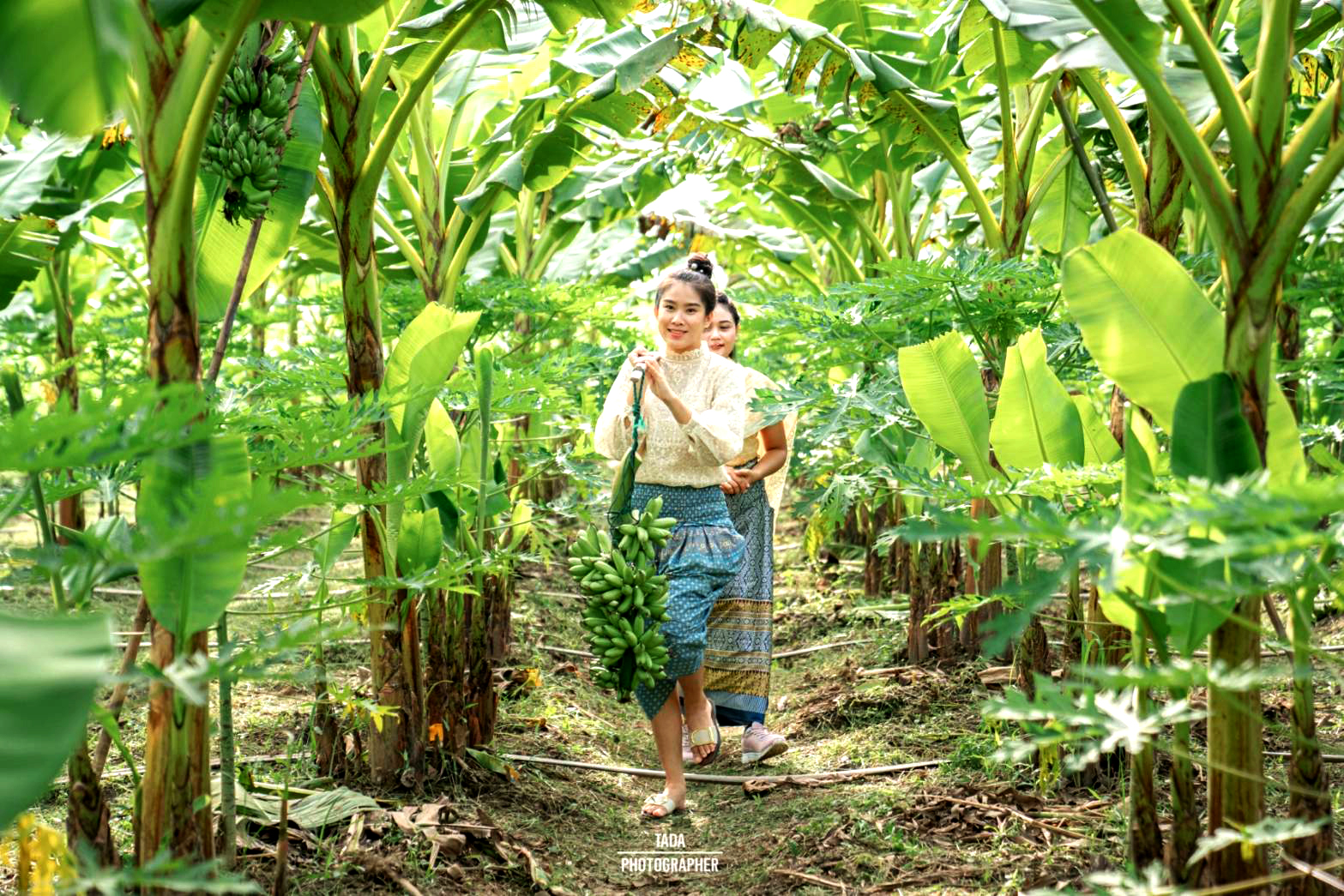Development of Community–Based Tourism Products of Ban Thong Kung, Kamphaeng Phet Province
Main Article Content
Abstract
The large-scale farming community of ladyfinger banana is located in Ban Thong Kung, Tha Phutsa subdistrict, Klong Klung district, Kamphaeng Phet province. It is known as a traditional community of the province. The unique way of life and culture is suitable for developing community–based tourism products. The research first aims to creatively develop community–based tourism products in relation to local history, culture, and identity. Thus, the development are conducted in three aspects, namely the local sweet herb crunchy cereal bar, local cuisine based on local banana farmer’s recipes, and the travel route of tourist attractions. The second objective is to develop community potential based on Thailand Community-Based Tourism (CBT) Standard. The third objective is to develop marketing channels for the community-based tourism. After discovering problems and investigating the potential of the community in terms of tourism, an assessment of the community potential based on CBT Thailand criteria. The development process was conducted as follows: 1) planning and developing with the cooperation between researchers and the community, 2) developing local products, 3) developing community potential, and 4) developing marketing channels. The development resulted in increasing community income to 80,000 bath/year and increasing the number of visitors to 660 visitors/year. The highest score of evaluating tourism potential based on CBT Standard was the aspect of preserving and promoting cultural heritage. Finally, the project yields the development of marketing channels both online and offline including websites, social media, in-store selling, joining trade shows and exhibitions, and selling to local retail stores.
Article Details

This work is licensed under a Creative Commons Attribution-NonCommercial-NoDerivatives 4.0 International License.
Area Based Development Research Journal values copyright protection and licensing to safeguard author rights and facilitate the appropriate dissemination of research. Our policies ensure openness, accessibility, and attribution. Authors retain copyright ownership, and articles are published under a Creative Commons Attribution License (CC BY), allowing sharing, adaptation, and proper attribution. Authors have the freedom to publish under the CC BY license, granting broad reuse and distribution permissions. The journal supports posting articles on third-party repositories, adhering to institutional and funding restrictions. Author guidelines detail copyright and licensing requirements, empowering authors with knowledge about their rights and responsibilities. These policies cultivate an environment of collaboration, openness, and responsible sharing, benefiting authors and the research community while honoring intellectual property rights.
References
Board of Directors of the National Tourism Policy. (2020). The community-based tourism development assessment criteria. Retrieved December 20, 2020, from: https://opendata.data.go.th/dataset/item_db41976b-78b5-4c3d-b13d-223414de8c2b. (in Thai).
Department of Intellectual Property. (2017). Announcement record of geographical indications. Retrieved December 25, 2020, from:https://ipthailand.go.th/th/gi-011.html. (in Thai).
Detaum, P. (2013). The creative tourism development: From concepts to practice for Thailand. Silpakorn University Journal, 33(2), 329-364. (in Thai).
Kamphaeng Phet Provincial Agriculture and Cooperatives Office (2021). Agricultural statistics report economic crops of Kamphaeng Phet province in cultivation year 2020/2021. Retrieved January 25, 2021, from: https://www.opsmoac.go.th/kamphaengphetdwl-preview-431091791819. (in Thai).
Kerin, R. A., Berkowitz, E. N., Hartley, S. W., & Rudelius, W. (2003). Marketing (8th edition). Singapore: McGraw-Hill Inc.
Keawsa-nga, P., & Jamnongsri, N. (2012). Creative tourism: New choice of Thai tourism. Suranaree Journal of Science and Technology, 6(1), 91-109. (in Thai).
Kotler, P., Bowen, J., & Makens, J. (2003). Marketing for hospitality and tourism. Upper Saddle River, NJ: Pearson Education.
Maneerot, N. (2017). Community based tourism management. Journal of International and Thai Tourism, 12(2), 25-46. (in Thai).
Micheels, E. T., & Gow, H. R. (2015). The effect of market orientation on learning, innovativeness, and performance in primary agriculture. Canadian Journal of Agricultural Economics, 63(2), 209-233.
Pantaruk, S., & Cheablaem, O. (2020). Development of comnunity enterprise and networks for health tourism in Khanom district, Nakhon Si Thammarat province. Area Based Development Research Journal, 13(1), 1-15. (in Thai).
Pongpinyoopat, S., Meepripruk, M., Boonniyom, P., Vinitkul, R., Boontiang, A., Atsalikorn, W., ..., & Ninjinda, K. (2019). Local research center for lady finger banana research of Ban Thong Kung, Tha Phutsa sub-district, Klong Klung district, Kamphaeng Phet. (Research report). Kamphaeng Phet: Research and Development Institute, Kamphaengphet Rajabhat University. (in Thai).
Sarobol, S. (2004). Community based tourism management. Press release of Research Community, 57(10/11), 15-21. (in Thai).
The Community-based Tourism Institute. (2018). Community – based tourism – (CBT). Retrieved November 22, 2020, from: https://www.cbt-i.or.th. (in Thai).
The Community-based Tourism Institute. (2020). Community – based tourism – (CBT). Retrieved November 22, 2020, from: https://thaicommunitybasedtourismnetwork.wordpress.com/cbt. (in Thai).
The National Strategy Committee. (2017). The 20-year strategy (Years 2017 - 2036). Bangkok: The Secretariat of the Prime Minister, Royal Thai Government. (in Thai).
The Office of Tourism and Sport Economic. (2018). Tourism statistics. Retrieved November 22, 2020, from: https://www.mots.go.th/more_news_new.php?cid=504. (in Thai).
The Office of Kamphaeng Phet Province. (2019). Basic information. Retrieved November 22, 2020, from: http://www.kamphaengphet.go.th/kp/index.php/data-kpp/item/1379-2020-jun-09-04-59-51. (in Thai)
Thongma, W. (2004). The community-based tourism for improving the quality of life to communities in the forest area. Bangkok: Department of National Parks, Wildlife and Plant Conservation. (in Thai).
Visadsoontornsakul, P., Na Talang. C., Jittithavorn, C., & Tungbenchasirikul, S. (2020). Potential development approach for communitybased tourism in Nakhon Ratchasima province. The Journal of Development Administration Research, 14(34), 31-43. (in Thai).


